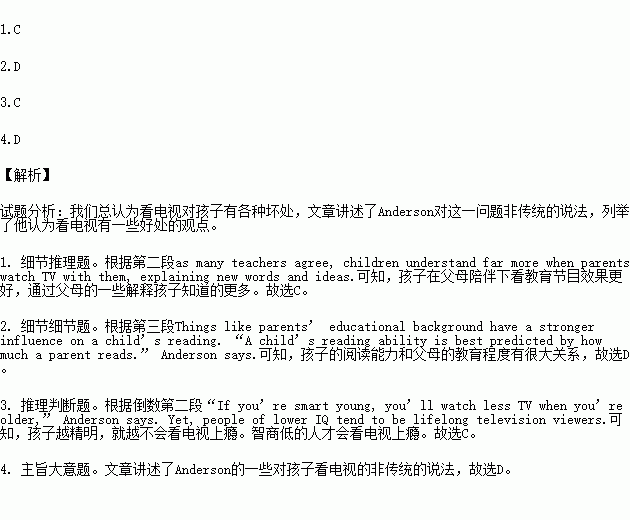题目内容
Daniel Anderson, a famous psychologist, believes it’s important to distinguish television’s influences on children from those of the family. We tend to blame TV, he says, for problems it doesn’t really cause, overlooking our own roles in shaping children’s minds.
One traditional belief about television is that it reduces a child’s ability to think and to understand the world. While watching TV, children do not merely absorb words and images (影像). Instead, they learn both explicit(明确的) and hidden meanings from what they see. Actually, children learn early the psychology of characters in TV shows. Furthermore, as many teachers agree, children understand far more when parents watch TV with them, explaining new words and ideas. Yet, most parents use an educational program as a chance to park their kids in front of the set and do something in another room.
Another argument against television is that it replaces reading as a form of entertainment. But according to Anderson, the amount of time spent watching television is not related to reading ability. TV doesn’t take the place of reading for most children; it takes the place of similar sorts of recreation, such as listening to the radio and playing sports. Things like parents’ educational background have a stronger influence on a child’s reading. “A child’s reading ability is best predicted by how much a parent reads.” Anderson says.
Traditional wisdom also has it that heavy television-watching lowers IQ (智商) scores and affects school performance. But here, too, Anderson notes that no studies have proved it. In fact, research suggests that it’s the other way around. “If you’re smart young, you’ll watch less TV when you’re older,” Anderson says. Yet, people of lower IQ tend to be lifelong television viewers.
For years researchers have attempted to show that television is dangerous to children. However, by showing that television promotes none of the dangerous effects as conventionally believed, Anderson suggests that television cannot be condemned without considering other influences.
1.An educational program is best watched by a child _________.
A. on his ownB. with other kids
C. with his parentsD. with his teachers
2.Which of the following is most related to children’s reading ability?
A. Radio-listening.
B. Television-watching.
C. Parents’ reading list.
D. Parents’ educational background.
3.Anderson believed that _________.
A. the more a child watches TV, the smarter he is
B. the younger a child is, the more he watches TV
C. the smarter a child is, the less likely he gets addicted to TV
D. the less a child watches TV, the better he performs at school
4.What is the main purpose of the passage?
A. To advise on the educational use of TV.
B. To describe TV’s harmful effects on children.
C. To explain traditional views on TV influences.
D. To present Anderson’s unconventional ideas.

